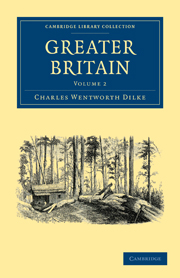Book contents
- Frontmatter
- Contents
- LIST OF ILLUSTRATIONS
- PART III
- PART IV
- CHAP. I MARITIME CEYLON
- CHAP. II KANDY
- CHAP. III MADRAS TO CALCUTTA
- CHAP. IV BENARES
- CHAP. V CASTE
- CHAP. VI MOHAMEDAN CITIES
- CHAP. VII SIMLA
- CHAP. VIII COLONIZATION
- CHAP. IX THE “GAZETTE”
- CHAP. X UMRITSUR
- CHAP. XI LAHORE
- CHAP. XII OUR INDIAN ARMY
- CHAP. XIII RUSSIA
- CHAP. XIV NATIVE STATES
- CHAP. XV SCINDE
- CHAP. XVI OVERLAND EOUTES
- CHAP. XVII BOMBAY
- CHAP. XVIII THE MOHURRUM
- CHAP. XIX ENGLISH LEARNING
- CHAP. XX INDIA
- CHAP. XXI DEPENDENCIES
- CHAP. XXII FRANCE IN THE EAST
- CHAP. XXIII THE ENGLISH
- INDEX
- Plate section
CHAP. XIX - ENGLISH LEARNING
Published online by Cambridge University Press: 29 August 2010
- Frontmatter
- Contents
- LIST OF ILLUSTRATIONS
- PART III
- PART IV
- CHAP. I MARITIME CEYLON
- CHAP. II KANDY
- CHAP. III MADRAS TO CALCUTTA
- CHAP. IV BENARES
- CHAP. V CASTE
- CHAP. VI MOHAMEDAN CITIES
- CHAP. VII SIMLA
- CHAP. VIII COLONIZATION
- CHAP. IX THE “GAZETTE”
- CHAP. X UMRITSUR
- CHAP. XI LAHORE
- CHAP. XII OUR INDIAN ARMY
- CHAP. XIII RUSSIA
- CHAP. XIV NATIVE STATES
- CHAP. XV SCINDE
- CHAP. XVI OVERLAND EOUTES
- CHAP. XVII BOMBAY
- CHAP. XVIII THE MOHURRUM
- CHAP. XIX ENGLISH LEARNING
- CHAP. XX INDIA
- CHAP. XXI DEPENDENCIES
- CHAP. XXII FRANCE IN THE EAST
- CHAP. XXIII THE ENGLISH
- INDEX
- Plate section
Summary
The English traveller who crosses India from Calcutta to Bombay is struck with the uncivilized condition of the land. He has heard in England of palaces and temples, of art treasures and of native poetry, of the grace of the Hindoo maidens, of Cashmere shawls, of the Taj, of the Pearl Mosque, of a civilization as perfect as the European, and as old as the Chinese. When he lands and surveys the people, he finds them naked barbarians, plunged in the densest ignorance and superstition, and safe only from extermination because the European cannot dwell permanently in the climate of their land. The stories we are told at home are in no sense false:—the Hindoos, of all classes, are graceful in their carriage; their tombs and mosques are of extraordinary beauty, their art patterns the despair of our best craftsman; the native poetry is at least equal to our own, and the Taj the noblest building in the world. Every word is true, but the whole forms but a singularly small portion of the truth. The religious legends, the art patterns, the perfect manner and the graceful eye and taste seem to have descended to the Hindoos of to-day from a generation whose general civilization they have forgotten. The poetry is confined to a few members of a high-caste race, and is mainly an importation from abroad; the architecture is that of the Moslem conquerors.
- Type
- Chapter
- Information
- Greater Britain , pp. 365 - 373Publisher: Cambridge University PressPrint publication year: 2009First published in: 1868



